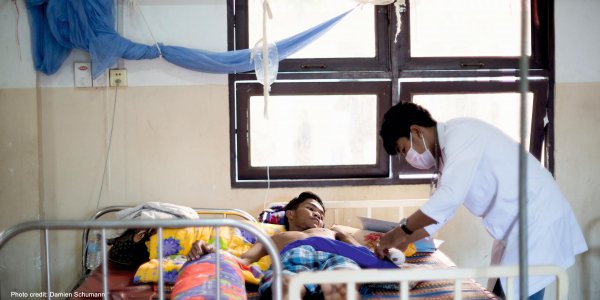Krintafel (tafenoquine) approved for P. vivax malaria
GSK and Medicines for Malaria Venture (MMV) announce FDA approval of single-dose treatment Krintafel (tafenoquine) to prevent the relapse of P. vivax malaria.

The GSK and MMV are proud to announce that the United States Food and Drug Administration (FDA) has approved, under Priority Review, single-dose Krintafel (tafenoquine) for the radical cure (prevention of relapse) of Plasmodium vivax malaria in patients aged 16 years and older who are receiving appropriate antimalarial therapy for acute infection.
The approval was based on efficacy and safety data from a comprehensive global clinical development P. vivax radical cure programme designed in agreement with the FDA. Thirteen studies in healthy volunteers and patients directly supported the programme. The primary evidence for the clinical efficacy and safety of the 300mg single-dose, to which more than 800 subjects were exposed, was provided by three randomised, double-blind studies. The results of the two phase III studies were announced in June 2017. The submission included data analysed from a total of thirty-three studies involving more than 4,000 trial subjects exposed to the 300mg single-dose and other doses of tafenoquine.
"Today's approval of Krintafel, the first new treatment for Plasmodium vivax malaria in over 60 years, is a significant milestone for people living with this type of relapsing malaria. Together with our partner, Medicines for Malaria Venture, we believe Krintafel will be an important medicine for patients with malaria and contribute to the ongoing effort to eradicate this disease" says Dr. Hal Barron, Chief Scientific Officer and President of Research and Development, GSK.
Dr. David Reddy, Chief Executive Officer of MMV adds: "The US FDA's approval of Krintafel is a major milestone and a significant contribution towards global efforts to eradicate malaria. The world has waited decades for a new medicine to counter P. vivax malaria relapse. Today, we can say the wait is over. Moreover, as the first ever single-dose for this indication, Krintafel will help improve patient compliance. We are proud to have worked side-by-side with GSK for more than a decade to reach this point. Our focus is now on working to ensure the medicine reaches the vulnerable patients that need it most."
The new drug application (NDA) was submitted by GSK to the FDA in November 2017 and a regulatory submission was also made to the Australian Therapeutics Good Administration (TGA) in December 2017. A decision from the TGA is awaited. Approvals by FDA and TGA will be informative to other regulatory agencies for their own approval process in malaria-endemic countries where tafenoquine will be provided as a not-for-profit medicine to maximise access to those who need it most.
About Krintafel (tafenoquine)
Krintafel is an 8-aminoquinoline derivative with activity against all stages of the P. vivax lifecycle, including hypnozoites. It was first synthesised by scientists at the Walter Reed Army Institute of Research in 1978. GSK's legacy in the research and development of tafenoquine as a potential medicine for malaria commenced over 20 years ago. In 2008, GSK entered into a collaboration with the not-for-profit drug research partnership, MMV, to develop tafenoquine as an anti-relapse medicine for patients infected with P. vivax. The tafenoquine clinical programme is part of GSK's global health programme aimed at improving healthcare for vulnerable populations.
What is Plasmodium vivax malaria?
The Plasmodium parasite is a complex organism with a lifecycle spanning both humans and mosquitoes. After an infected mosquito bite, the P. vivax parasite infects the blood and causes an acute malaria episode. It also has the ability to lie dormant in the liver (in a form known as hypnozoite) from where it periodically reactivates to cause relapses of P. vivax malaria. Hence, a single P. vivax infection can give rise to multiple episodes of malaria, in the absence of a new mosquito bite. These relapses can occur weeks, months or even years after the initial infection. The dormant liver forms of the parasite cannot be readily treated with most anti-malarial treatments active against the blood-stage parasite. The 8-aminoquinoline, primaquine, is currently the only FDA approved medicine that targets the dormant liver stage to prevent relapse. It must be taken for 14 days to be effective, a regimen that is associated with poor compliance.
The use of a medicine that targets the dormant liver forms of the parasite, co-administered with currently available anti-malarials such as chloroquine or artemisinin-based combination therapies (ACTs) is known as radical cure.
P. vivax malaria has a significant public health and economic impact, primarily in South-Asia, South-East Asia, Latin America and the horn of Africa. The disease is estimated to cause around 8.5 million clinical infections every year. The clinical features of P. vivax malaria include fever, chills, vomiting, malaise, headache and muscle pain, and in some cases, can lead to severe malaria and be fatal.
This approval is provided with important safety information. To read more about this visit MMV's website.
Source information: GSK and MMV press release.

